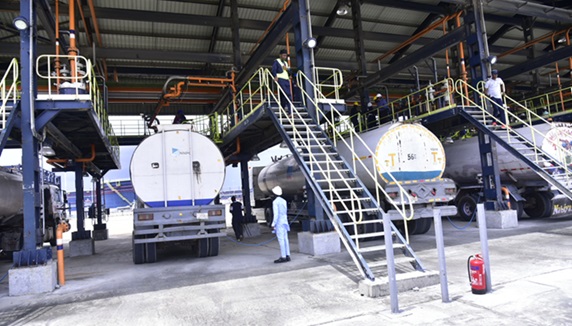The Federal Government has announced that the commencement of petroleum lifting from the Dangote Petroleum Refinery and Petrochemicals marks a return to industrialization and local refining in Nigeria.
This announcement came yesterday as a fleet of trucks from the Nigerian National Petroleum Corporation Limited (NNPCL), began transporting Premium Motor Spirit, commonly known as petrol, from the world’s largest single-train refinery, located in the Ibeju-Lekki area of Lagos State.
The Minister of Finance and Coordinating Minister of the Economy, Wale Edun, who led the government delegation, described the event as epoch-making and a renewal of Nigerians’ hope in industrialization and local refining.
“This is the resumption of Nigeria’s march toward industrialization. It represents a return to what we once had—local refining and local supply of petroleum products in the Nigerian market. It has been decades since we last achieved this, but we have it today,” he said.
The minister, who was accompanied by Dr. Zacch Adedeji, Executive Chairman of the Federal Inland Revenue Service and Chairman of the Technical Sub-Committee on naira-based crude sales to local refineries, also stated that the initiative will ensure energy self-sufficiency and security in Nigeria.
He explained that the product’s availability to Nigerians will end perennial scarcity and long queues.
He noted that this aligns with President Bola Tinubu’s vision of adding value to raw materials before they leave the country. He said that Tinubu originated the free trade zone concept during his term as governor of Lagos State.
“Today, you have taken an important step towards energy self-sufficiency in Nigeria. We have advanced toward energy security and the implementation of the government’s policy of boosting domestic investment.
“It is President Tinubu’s vision that no raw material should leave Nigeria’s shores without some form of value being added. Commendation is due to His Excellency, Bola Ahmed Tinubu, who facilitated the supply of crude to local refineries in naira by ensuring that NNPC provides crude to these refineries,” he added.
Edun lauded the President of Dangote Industries Limited, Aliko Dangote, and his team for restoring Nigeria’s status as a producer of refined products, nearly three decades after the country ceased local refining. He praised Dangote for his patriotism and for exemplifying the can-do spirit of Nigeria, despite skepticism from many quarters about the feasibility of establishing a refinery.

“We congratulate Dangote, Africa’s foremost businessman and industrialist, and arguably one of the top investors in the world, on this day of triumph and success. They said it couldn’t be done, that we could not produce PMS from this facility, but today we are all witnesses to the commencement of PMS loading here. This refinery is producing PMS that is sufficient for the entire Nigerian market, with a surplus for export.
“We call on other domestic refiners to not only supply the local market but also to change the narrative by producing petroleum products for the sub-region and beyond. This will generate additional foreign exchange revenue for the betterment of the economy. We are thrilled that this day has arrived,” he said.
Praising the quality of the products from the refinery, Edun noted that the facility’s global competitiveness enables it to export its products and sets a benchmark for Nigerian companies to compete favourably on the international stage.
He also commended the technical sub-committee on naira-based crude sales to local refineries for finalizing all formalities, ensuring a smooth supply of crude to local refineries. The Minister added that President Tinubu is also focusing on enhancing food security.
Vice President of Oil and Gas at Dangote Industries Limited (DIL), Devakumar Edwin, stated that the commencement of PMS production from the refinery fulfills Dangote’s vision of addressing energy supply challenges in Nigeria.
He emphasized that it is a point of pride that a Nigerian company has designed and built the world’s largest single-train refinery complex, which will not only make Nigeria self-sufficient in refined products but also a net exporter.
“If you consider the refinery’s capacity for PMS alone, processing 52,000 barrels of crude each day generates more than 54 million liters of PMS.
“Additionally, the refinery can produce other products. Specifically, 44% of the refinery’s capacity can meet 100% of domestic needs, while 56% is allocated for export. It is indeed a massive refinery,” he said.
Edwin maintained that the refinery would significantly benefit the country’s economy by reducing Nigeria’s foreign exchange demand by at least 40 percent while also generating foreign earnings through exports.
“It will not only substitute imports but also boost forex generation through export. We will save foreign exchange in two ways: first, by reducing expenditures on importing petrol, jet fuel, diesel, and other products, and second, through the revenue generated from exports,” he said.
He also addressed concerns about tankers overwhelming the Ibeju-Lekki area, as seen in Apapa.
Edwin assured that the refinery has made provisions for loading petroleum products via its jetty and emphasized that it includes a self-sufficient marine facility capable of handling the world’s largest vessels.

